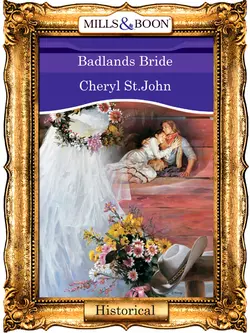Badlands Bride

Cheryl St.John
Тип: электронная книга
Жанр: Современная зарубежная литература
Язык: на английском языке
Стоимость: 386.29 ₽
Статус: В продаже
Издательство: HarperCollins
Дата публикации: 16.04.2024
Отзывы: Пока нет Добавить отзыв
О книге: Shooting a bandit was reporter Hallie Wainwright′s introduction to the Wild West, where she′d traveled with a bevy of mail-order brides.But it was the more intimate «hello» in the arms of Cooper DeWitt that sent her heart racing – and made it all the more difficult for her to tell the brawny plainsman that she wasn′t the woman he′d sent for… .When she jumped from the stage, shining with true grit and spewing tall tales, Cooper DeWitt thought he just might have struck gold. Raised with the Sioux, Cooper needed a wife who could brave the frontier and corral his restless heart. The problem was, his would-be bride had no intention of marrying him!